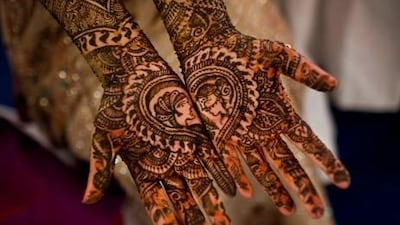By the end of this week the number of religious edicts released this year through the Fatwa Centre at the General Authority of Islamic Affairs and Endowments is expected to exceed 350,000. Fatwas clarify what is permissible and what is not under Islamic law. Rym Ghazal reports
ABU DHABI // Body paints in the form of gold or regular henna, as well as make-up, are allowed as long as they are not permanent - in the form of a tattoo.
Half sisters are allowed to shake hands with their brothers, whether their mother is Christian or not, and napping in the afternoon is not desirable, as it takes time away from productivity.
These were among the religious edicts released this year through the Fatwa Centre at the General Authority of Islamic Affairs and Endowments (Awqaf). The final total is expected to exceed 350,000.
The rulings, which are published on Awqaf's website, were made available this month to a much wider audience when the centre launched the English-language version of its website.
The move came in response to growing interest in content published by the Islamic authority, particularly the fatwas themselves.
"This decision was based on the tremendous interest in the General Authority of Islamic Affairs and Endowments website, both locally and internationally, and to help non-Arabic website visitors benefit from our services," said Dr Mohammad Mattar al Kaabi, Awqaf's director general. "The fatwa centre is a true success."
The religious edicts are issued through the Abu Dhabi fatwa centre in response to people's questions about what is permissible under Sharia law. The questions are either submitted online, via text or over the phone.
Since opening in August of 2008, the fatwa centre has witnessed a steady increase in the number of fatwas issued, and there are plans to hire more muftis next year to accommodate the growing demand for answers. The call centre employs 50 scholars, the majority of whom are men, and it is in the process of doubling that figure.
According to Awqaf, by November 1 it had issued 298,277 fatwas since the start of the year, with most inquiries - 258,436 - made by phone. The centre was averaging almost 30,000 fatwas a month, or 1,000 a day.
The centre issued a total of 343,121 last year and 142,117 during the months it was open in 2008.
In a statement released in September, Awqaf predicted that the centre might end up issuing a total of a million fatwas since its opening - but it appears it will be several more months before it will reach that goal.
The most common questions address confusion over the specifics of worship, whether it is how to conduct certain prayers or specific queries related to Zakat and Haj.
One fatwa called on worshippers to always "be clean" when heading to the mosque and to avoid eating garlic right before as the smell "offends" those trying to pray.
Watching TV channels or checking websites that instigate hate or division should also be avoided.
One fatwa clarified the status of car raffles, which are conducted at many of the country's major malls, stating: "It is not permissible to buy a coupon of a specific amount for the purpose of entry in a draw for a car, because it is ambiguous and a kind of gambling."
Others govern behaviour in public places, indicating it is OK to eat dates from palm trees growing in public areas as long as no harm is caused to the tree itself.
One fatwa provided a reminder that it is not legal to kill a "noisy" donkey, animal or bird, no matter how loud or inconvenient its utterances may be.
Even the noisy vuvuzela warranted a fatwa, with a decree allowing the plastic horn's usage in the stadium and its trade as long as it causes no harm to the people around it: "Whoever brings it or trades in it, must ensure that its power is not over 100 decibels so as to avoid damaging people's hearing."
Others focused on more personal issues. Muslim women are allowed to live on their own "as long as it was in a safe place".
In response to a question from a single woman, the centre ruled that there were no specific prayers for "getting a husband". The fatwa instead called on single women to make more general prayers asking for "a need" to be fulfilled and for help from Allah in easing their life.
This year also saw the regulation of fatwas, with King Abdullah of Saudi Arabia issuing a decree last Ramadan allowing only senior clerics or Islamic religious edicts to issue fatwas.
Similar stances were taken in the UAE, with one of the Friday sermons warning people against accepting fatwas unless issued from the rightful authorities.
The English-language version of the Awqaf website is: www.awqaf.ae/?Lang=EN.

